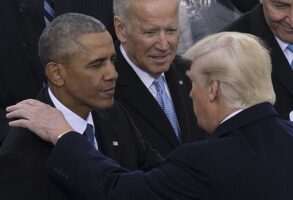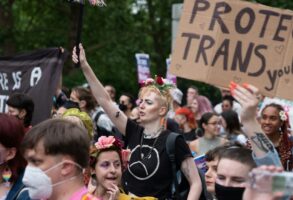Published January 28, 2014
The drama of Ukraine continues, with perhaps some glimmers of hope appearing. Prime Minister Mykola Azarov, a major obstacle to reform, has resigned. The Ukrainian Rada met in extraordinary session on January 28, and while some movement toward reform was evident –- most of the odious anti-civil-liberties laws of January 16, whose passage under duress triggered the latest wave of protests across the country, were repealed by a vote of 361-2 — there should be no premature rejoicing that the forces of civic renewal and political reform have carried the day.
The Rada will meet again in emergency session Wednesday to consider amnesty for prisoners arrested by the regime’s forces during recent protests. But there is no agreement between the reformers and the regime on an amnesty bill, with the regime saying it will accept an amnesty if the Maidan, the square in Kiev that has been the epicenter of the national political upheaval of the past two months, is cleared — a quid pro quo immediately rejected by the leaders of the reform movement. Their refusal reflects the universal view of the people of the Maidan, who are not fools and who are not about to give up their chief weapon in this struggle.
There is also no agreement on constitutional reform. And while there are reports of an ad hoc commission on constitutional reform being created by the January 29 Rada session, it will take time for any such effort to produce acceptable results. Meanwhile, arrests and kidnappings continue; some activists remain unaccounted for; and Maidan protesters continue to pressure local and regional governments throughout the country.
Thus, while the immediate threat of a descent into bloody chaos seems to have abated, the steps taken thus far have been but the beginning of a long journey. It would be highly counterproductive for Western governments and NGOs to let up on whatever levers of pressure they can exert on the Yanukovych regime — which continues to hold more than a few face cards in its hand. And it would be even worse for EU governments or the U.S. to press for quick-fix compromises that do not address the crucial constitutional flaw at the source of Ukraine’s current crisis, which is the concentration of power in the president’s office. Late on January 28, concerns emerged that just such a deal was being pressed on both Yanukovych and the reformers from Washington, a deal involving a certain amount of power-sharing but no real constitutional change. Any such deal would be a serious mistake. There are no short-cuts to be found in getting to a resolution of the Ukrainian crisis that meets the morally and politically serious standards set by the civic reformers who have braved freezing temperatures, regime brutality, and sniper fire. And while political compromise is one thing, reform leaders should not be pressured by the West to make premature constitutional compromises that will impede the long-term project of building a civil, decent, prosperous, and democratic Ukraine.
The breathing space that has been created in the past several days also affords an opportunity to look more closely at an often unexamined, but crucial, aspect of the Ukrainian drama, which is the Russian connection.
There have been persistent but unconfirmed reports from Kiev of Russian special forces or FSB agents being clandestinely involved in kidnappings, beatings, and even sniping against the Ukrainian civic-reform movement. But the lack of slam-dunk evidence for Russian involvement in the recent assaults on the Maidan movement should not raise any doubts on the larger issue: It is self-evident that Ukraine’s future looms large in the strategic master plan of Russian president Vladimir Putin, which involves nothing less than the reconstitution of the USSR, de facto if not de jure, in a reassembly of the former “Soviet space” as an exclusively Russian sphere of influence.
In advancing that grand design, Putin has not been fastidious about either his modus operandi or his partners. Armenia was cajoled, then threatened, then bribed and bullied into backing off its plans to pursue integration into the European Union. Those tactics having worked with the small fry, Putin then turned the screws on the biggest prize, Ukraine, threatening to wreak economic havoc in that country if the government of President Viktor Yanukovych did not retreat from longstanding plans to sign an association agreement with the EU at a summit in Vilnius this past November. Yanukovych’s cave-in to that pressure launched the Maidan movement, with all that has followed.
As to personalities, no one should imagine that Putin holds Yanukovych in any affection or regard. The Russian president is a clever, disciplined, and ruthless product of the KGB, which always regarded itself as a kind of aristocracy in the old USSR (despite its brutality and a pantheon of chieftains — Yagoda, Yezhov, Beriya, et alia — that constituted a horror show in its own right). Yanukovych, by comparison, got his start in life as a petty thief on railroad-station platforms, snatching a vulnerable handbag or two. To the Chekist Putin with his inbred sense of superiority, Yanukovych is a low-life who managed to bludgeon his way to the top of a country whose independent nationhood Putin doubtless denies (privately, if not publicly). Worse, Yanukovych has now revealed himself to be a low-life loser. Thus saving him is not a priority for Putin, any more than saving another dictator he despises — Belarus’s Alexander Lukashenko — would be, should Lukashenko ever find himself in the trouble that Yanukovych is now in.
But Putin is interested in avoiding any more trouble than he is likely to get from Islamist terrorists in the run-up to, and during, the Sochi Winter Olympics: a showcase event in which the Russian leader has invested tens of billions of dollars and an incalculable amount of prestige. Thus Putin declared on January 28 that “the Ukrainian people can sort this out themselves” while pledging that “Russia will never interfere in this [i.e., Ukraine’s current crisis].” Which is, of course, a pledge that should be trusted as much as one would trust a rattlesnake with a silencer on its rattle (to borrow from Dean Acheson).
In making that non-interference pledge, however, Putin could not resist a side-swipe at those European leaders who had expressed support for the Maidan civic reformers, suggesting that this constituted the kind of meddling that Europeans would not tolerate were the Russian foreign minister to go to, say, Greece and start making anti-European comments to Greeks demonstrating against economic reforms being pressed from Brussels. Even more tellingly, Putin spoke of the “consideration” that must be given to “certain specifics of relations between Russia and Ukraine” in bluntly stating that continued, open support by European diplomats for the Maidan movement “is simply unacceptable and impossible for us.”
By “certain specifics of relations between Russia and Ukraine,” Putin was likely referring, at least obliquely (and perhaps even unconsciously), to something more than the $15 billion economic lifeline he tossed Yanukovych as a reward for the Ukrainian president’s backing off the EU association agreement. One suspects that he was referring to the ancient Russian notion that the people of Ukraine — those “borderland” types, as the etymology of the country’s name implies — are an inferior lot who can only be managed and kept in order by the superior folk of great Russia. Recently, in remarks that previewed Putin’s January 28 warnings, Russian foreign minister Sergiy Lavrov referred to Ukrainians as Russians’ “brothers” — deftly omitting the pejorative adjective “little,” which many Russians habitually attach to “brothers” when describing Ukrainians.
Ethnic and cultural snobberies and longstanding Russian convictions about the divinely ordered leadership role of Russia in the Slavic world are not all that is at work here, however. Putin, the geopolitical strategist who once declared the breakup of the old USSR a historic disaster, knows that Russia cannot be a superpower without Ukraine. Moreover, Putin can read a map (a skill which sometimes seems beyond the capacities of Western leaders); and from the map he can see quite clearly that a Russia that has brought Ukraine back under its hegemony is a Russia poised once again on the borders of central Europe — a point that has certainly not been missed in Vilnius, Warsaw, and elsewhere in the neighborhood. Further, Putin understands that a successfully reformed Ukraine would, over the long haul, be a living rebuke to the post-Soviet model he has tried to sell the world as a grand success.
So what might Putin’s strategic game plan be?
Veteran Russian democracy activist Andrey Piontkovsky told Window on Eurasia’s Paul Goble that, as “Putin cannot swallow Ukraine whole,” he is likely moving toward a “Plan B,” which would involve “the dismemberment of Ukraine and the subordination to Moscow of eastern Ukraine.” But this, Piontkovsky argues, will not work, because of the now-significant Maidan movements in eastern Ukraine, who “want to get rid of their own bandits in power” and who would not accept a divided country in which their portion would be under Moscow’s thumb (and worse). Thus, on Piontkovsky’s analysis, the final gambit left to Putin, “Plan C,” would be “the seizure of Crimea,” to preserve Russian access to the Black Sea (and the Mediterranean). This would cause an uproar internationally, but is, Piontkovsky judges, a play that Putin could, “in principle,” pull off.
None of this drama is likely to happen during the Sochi Games (which is perhaps the only reason anyone has ever found to justify snowboarding and freestyle skiing as Winter Olympic “sports”). But as Ukraine sorts through the complexities of civic renewal, constitutional reform, and political change, which have been made even more challenging by Yanukovych-regime brutalities that have ignited long-smoldering public anger, it would be well for Washington and Brussels to pay attention to the broader strategic picture. For Ukraine’s future will have a marked impact on the future of Europe, and of the West.
— George Weigel is Distinguished Senior Fellow of Washington’s Ethics and Public Policy Center, where he holds the William E. Simon Chair in Catholic Studies.







